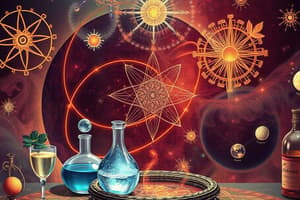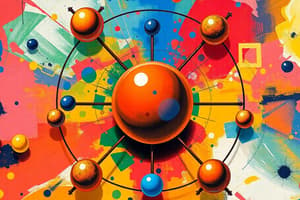Podcast
Questions and Answers
What is the fundamental piece of matter that retains the chemical identity of an element?
What is the fundamental piece of matter that retains the chemical identity of an element?
- Compound
- Atom (correct)
- Element
- Molecule
All atoms of the same element have identical mass.
All atoms of the same element have identical mass.
False (B)
What is the term for atoms of an element with the same atomic number but different numbers of neutrons?
What is the term for atoms of an element with the same atomic number but different numbers of neutrons?
Isotopes
The ______________________ of an atom defines what element it is.
The ______________________ of an atom defines what element it is.
Match the subatomic particles with their properties:
Match the subatomic particles with their properties:
Who proposed that matter consists of various combinations of the four 'elements' and could be infinitely divided?
Who proposed that matter consists of various combinations of the four 'elements' and could be infinitely divided?
According to Dalton's Atomic Theory, atoms of one element have different chemical properties from atoms of all other elements.
According to Dalton's Atomic Theory, atoms of one element have different chemical properties from atoms of all other elements.
What is the smallest unit of an element that can participate in a chemical change?
What is the smallest unit of an element that can participate in a chemical change?
A compound consists of atoms of 2/+ elements combined in a small, whole-numbered __________.
A compound consists of atoms of 2/+ elements combined in a small, whole-numbered __________.
Match the following scientists with their contributions to the atomic theory:
Match the following scientists with their contributions to the atomic theory:
Study Notes
The Atomic Theory
- Leucippus and Democritus proposed that matter is composed of small, finite particles called "atomos" that differ in shape and size and can join together.
- Aristotle believed that matter consists of various combinations of the four "elements" and can be infinitely divided.
Dalton's Atomic Theory
- Matter is composed of exceedingly small particles called "atoms".
- An atom is the smallest unit of an element that can participate in a chemical change.
- An element consists of only one type of atom with a characteristic mass that is the same for all atoms of that element.
- A compound consists of atoms of two or more elements combined in a small, whole-numbered ratio.
- Atoms of one element differ in properties from atoms of all other elements.
- Atoms are neither created nor destroyed during a chemical change, but are instead rearranged to yield substances that are different from those present before the change.
Revisions to Dalton's Theory
- Elements can be decomposed under special circumstances.
- Radioactive decay can occur.
- Not all atoms of the same element have identical mass due to the existence of isotopes.
- Atoms are composed of subatomic particles, including protons, neutrons, and electrons.
Subatomic Particles
- Protons are positively charged particles that define what element an atom is and determine its chemical behavior.
- Atomic number is the number of protons in the nucleus of an atom, which determines the identity of the atom.
- Neutrons are uncharged particles found within all atomic nuclei (except for hydrogen-1).
- Electrons are negatively charged particles that surround the atomic nucleus in pathways called orbitals.
Isotopes
- Isotopes are atoms of an element with the same atomic number but different numbers of neutrons.
- Standard Isotopic Notation includes the mass number (upper left side of element symbol) and atomic number (bottom left side of element symbol).
- Mass number is the total number of protons and neutrons for an element, and mass number - atomic number = number of neutrons.
Atomic Mass
- Atomic mass is the weighted average of all naturally occurring isotopes of an element.
- Relative atomic mass units (amu) are used due to the small size of a single atom.
- Atomic mass is listed underneath or above the symbol of an element.
Studying That Suits You
Use AI to generate personalized quizzes and flashcards to suit your learning preferences.
Description
This quiz covers the history of the atomic theory, including the contributions of Leucippus, Democritus, Aristotle, and John Dalton. It explains the concept of atoms and their characteristics.




